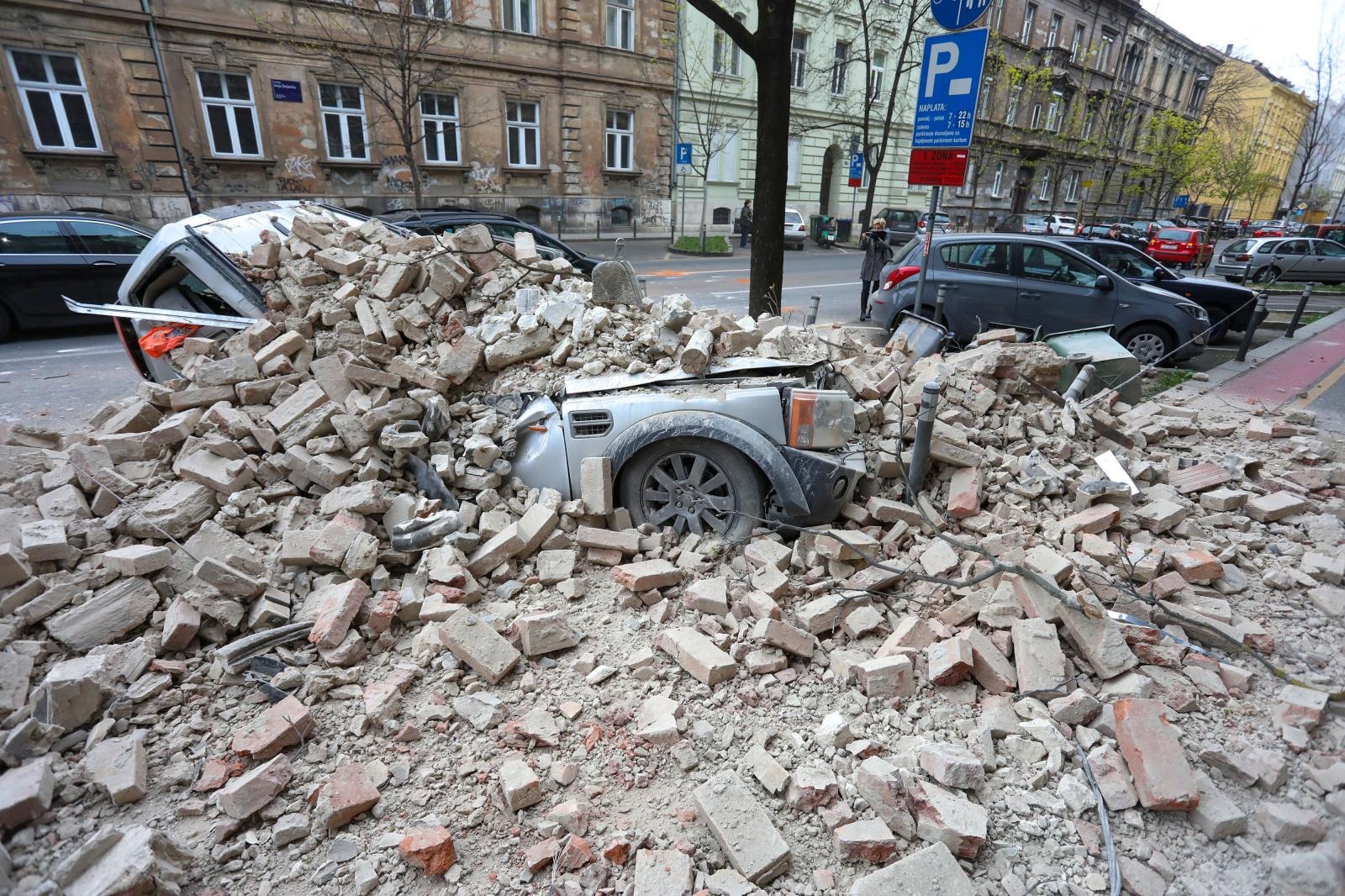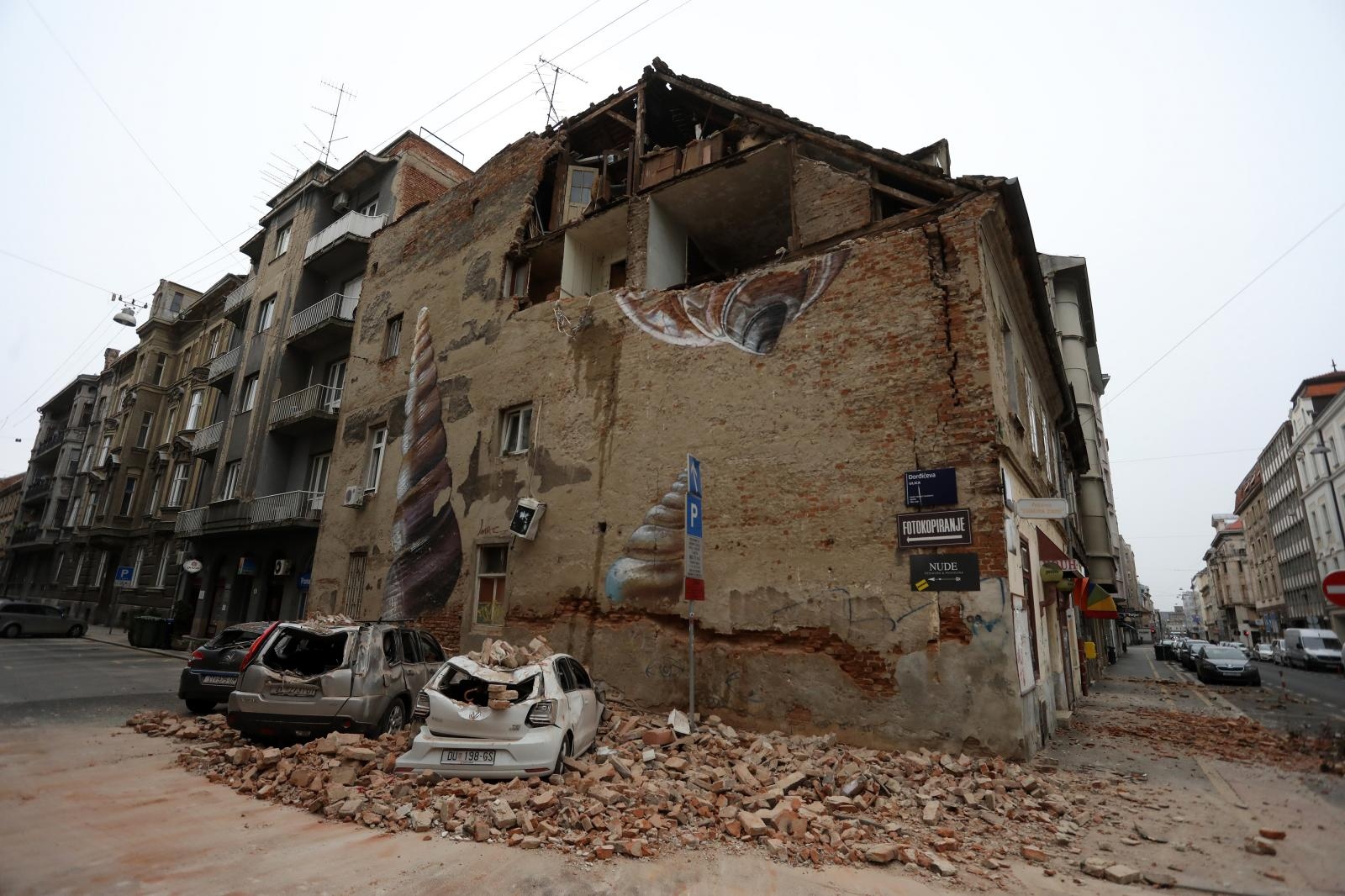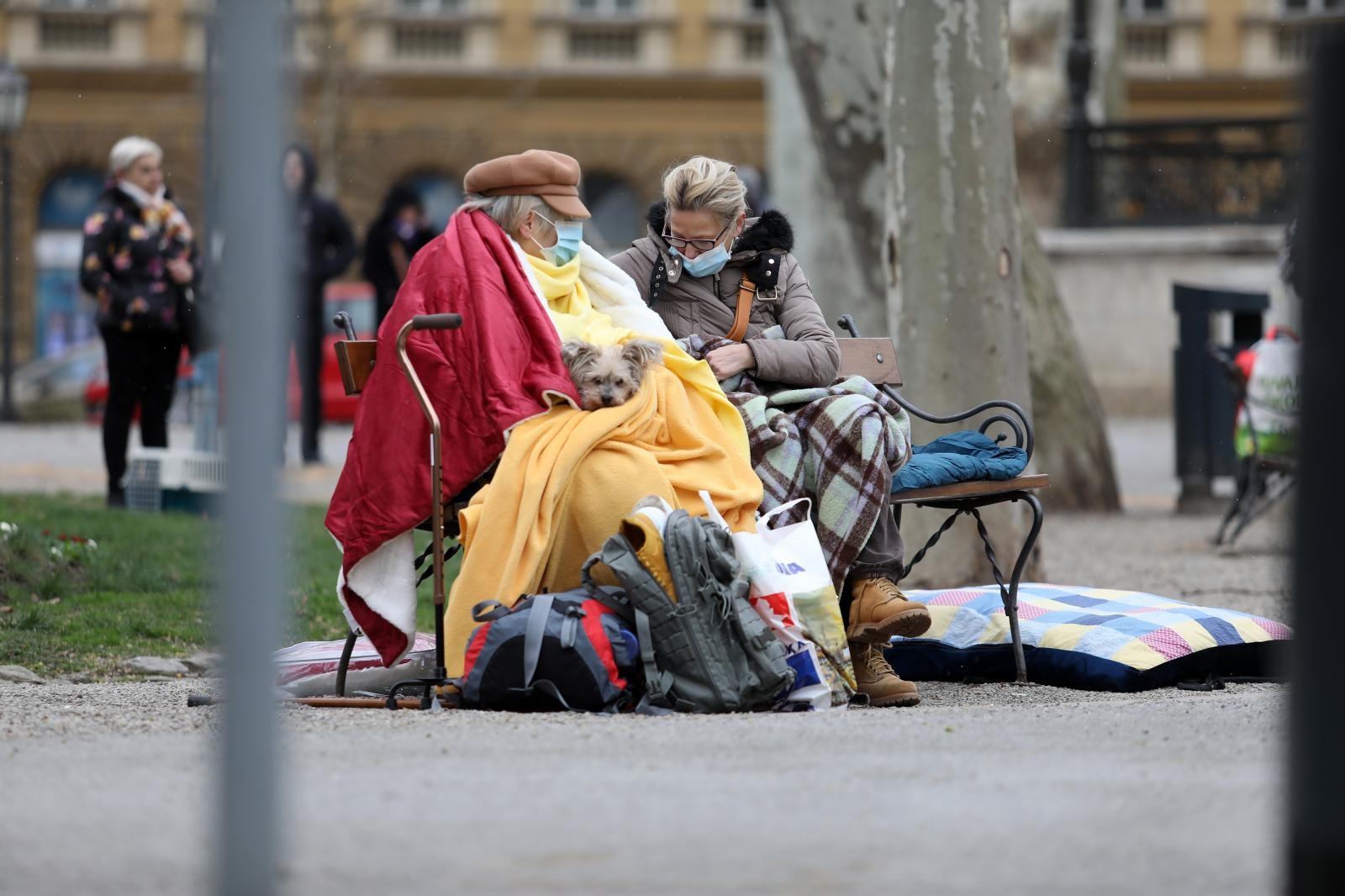VIDEO: Zagreb Earthquake 2020, One Year Later
March 22, 2021- On the Zagreb Earthquake 2020 first anniversary, TCN reporters Ivor Kruljac and Jose Alfonso Kusijanović took to Zagreb's streets to see how locals feel one year later.
6:24 AM March 22, 2020. It was Sunday, but sleep was as light as it was a workday full of obligations. Zagreb's citizens were awakened by a horrible sound followed by walls shaking, the ground trembling and things falling all over the place. Amid the coronavirus pandemic, at the very end of the first week of the first lockdown where it was advised to stay indoors to prevent the spread of the virus, there was no choice but to rush out of the house, discombobulated and without a clue of what exactly is the damage that 5.5 magnitude earthquake did. Individuals, couples, and entire families were outside but at a distance from one another, and just after the first aftershock, it started to snow. If you didn't leave the very center of Zagreb, the first sign of damage was the cathedral, whose top of the left tower collapsed, and only later you started to see the images of the center, which many compared online to Beirut. The Covid-19 National Response Team expressed its condolences on TV but warning everyone to keep the distance due to corona. Emergency services rushed to the city, later followed by the army. People who lost their homes were taken to student dorms and other locations with free space in the following days. Sadly, a 15-year-old-girl was fatally injured during the earthquake and passed away at Klaićeva's Children Hospital.
One year later, citizens of Zagreb still have mixed feelings about the event. Here are their answers in our short interview.
Shaking the memory
Senior citizen Ljerka was walking around European Square. Her home survived the quake, and the aftermath was books that fell from a shelf and broken bottles and jars in her pantry. She learned about that damage after a few days when she returned home from her sister's because she was too scared to be alone. The memory of last year still gives her the chills. „I jumped out of bed and lost my head; you have no idea where to go. You don't know what to do. I quickly grabbed something, half-dressed, rushed to the street. People were standing outside confused who didn't know where to go or what to do, nothing“, she said. Describing herself as an optimistic person, the scary experience is still stuck with her even one year later. „You remember it from time to time, but you can't forget it," said Ljerka.
A young guy named Dejan Jakovljević was casually walking around a crowded Dolac market, carefully with a mask to respect the measures in the crowds. He handled the earthquake pretty well as he lives in a new building with lots of concrete and reinforcement.
„It woke me up, but I knew it was an earthquake. It didn't scare me. I just waited for it to be over“, said Dejan. Responding to how he feels about it one year later, he briefly acknowledged that he „honestly forgot about it. “

Borna Filic / PIXSELL
The same can't be said for American-born Stefanie Mikac from New York. We met her while she was walking her dog in Zrinjevac park. Her home was badly damaged. „I was in the bathroom dancing left and right. I didn't think it was an earthquake, I thought 'what is it, the devil had come!’ and there was smoke“, remembered Stefanie. When she realized it was an earthquake, she hid under the door, and when it passed, she searched for her dog that hid in the apartment before finally escaping her flat. On her trip to Hawaii, where earthquakes are quite frequent, she accepted that there is not much you can do against mother nature. Despite her bad experience, a year later, she feels safe in Zagreb. „Very secure, safe. You know, you have to take things as they come, “ said Stephanie sharing her positive attitude.
We spotted Mira Francem walking on Jelačić square. Her house was built following all the construction demands and proved to be earthquake-proof. Still, the rocky feeling isn't something that she liked. „I personally felt terrible. I had a feeling the whole world was collapsing, and in the end, that feeling of losing the ground under my feet is an instinct, you know?”, said Mira adding that even though her house is fine, the trembling ground was awful. When asked if there is still anxiety over the last year's event, she resoundingly repeated, “yes.”

Borna Filic / PIXSELL
Mladen Habuš was standing on Vlaška street that connects European Square with Kaptol, where the City's cathedral is located.
“My home was okay. The earthquake surprised everyone at first, but fortunately, they don't last, so you stabilize psychologically”, said Mladen calmly, as if it didn’t really leave an impression on him.
“I already forgot about it because it's not as frequent as in Glina or Petrinja, whereas they say, it shakes every five minutes,” he emphasized, and that the key is to remain relaxed.
December – another round, another rumble
The second earthquake with a 6.4 magnitude that hit Petrinja and ravaged Banovina / Banija didn't damage Zagreb as it did to the southern part of central Croatia. Still, it was certainly felt, and many agreed it was stronger than the one in March.
„Jesus Christ! That one was even worse!“said Ljerka the second I mentioned the Petrinja earthquake. She learned that Zagreb is situated in a seismic active area, and earthquakes are something people in Zagreb need to learn to live with, but March didn't make her welcome the December tremble with more ease. She ran out of the house, not knowing what when her niece, who also lives in Zagreb, called her.
„I asked her if there was another earthquake in Zagreb. I didn't get anything. She said, 'no, that's the aftermath of Petrinja.' We are really close to Petrinja“, said Ljerka.

Nikola Cutuk / PIXSELL
Stephanie was walking her dog during the Petrinja earthquake. She witnessed bricks falling and was relieved nobody was passing underneath at the time. However, when she returned home, she entered the mess, and the damages that were still not fixed from March intensified. „All the cracks are wider now, and everything will need to be taken down to get to the healthy wall,” said Stephanie.
When asked if the December quake was easier or the same to handle for her, she laughed, acknowledging that it was actually worse. “We repeated the reactions from the first earthquake, you know? It's a very unpleasant feeling even today when a tram passes or something buzzes. I think something is trembling, and we are quite tense”, shared Mira. She said that no matter how rational you are, consequences as emotions are different from rationale. “I'm really sorry for those people. My house isn't damaged, but I was scared and lost, and I can only imagine how those people felt. It's a huge catastrophe on which we cannot influence,” said Mira with empathy.
Dejan felt the December quake was stronger but feeling safe in his building; he wasn't too worried. “I instinctively rushed to save the TV. Everything else was irrelevant”, recalled Dejan with gentle laughter underneath his mask.
Despite Mladen being relaxed after Petrinja, anxiety crept up on him too. “You start listening; someone starts a car, you raise your head to see what's going on. You are expecting another earthquake”, said Mladen. Still, he added that “you get used to it.”
Insurance vs. safe building
As revealed earlier this year, 85% of Croatian households don't have earthquake insurance.
Dejan doesn't know if the building had insurance but given his building proved safe, he didn't seem too concerned with that question.
Mira also didn't have insurance, but her investment in the safe building certainly paid off.
Stephanie's home was badly damaged, but she pays 1200 kuna annually for insurance and says it isn't too expensive in Croatia. However, regarding the walls in her home that need to be fixed, there was a bit of an issue. „The insurance company actually secured only the furniture, but then through a lawyer, we made a deal to cover half of it. Something is better than nothing“, said Stephanie.
Ljerka complemented her landlord and how she manages things. Her building received a green sticker but chimneys needed to be removed. Insurance helped there a lot. „We took down the chimney ourselves, and we got the money back, I think 3000 kuna, “ said Ljerka. The roof was renewed a year or two ago, but the same couldn't be said about the terrace residents have in the back of the building. Insurance didn't want to cover it, and a loan was needed to be taken for the fixture.
City officials to the rescue! Or not?
Both the country and international community, not to mention companies and individuals, rushed to help Zagreb, and the now-deceased mayor Milan Bandić found himself challenged to return Zagreb to its old glory and shine as fast as possible. The situation even called for a Zagreb reconstruction bill on the parliament level as the government took the lead in rebuilding the city. In the meantime, Bandić passed away, and with local elections coming up, the city's repair remains a topic for all the candidates that hope to take the lead chair of city politics in May.
Regarding the response of the city officials, Ljerka isn't happy.
„What did the city do? Nothing. It was all ruins. Look at what Zagreb looks like now after the earthquake. How long has passed, and nothing is done. Nothing. Only the houses that people renovated themselves, but the city gave nothing”, commented Ljerka. She did, however, add that the city doesn’t have money and that she understands that.
Mira shares Ljerka's opinion that the situation is better for those who organized repairs privately. Still, when it comes to the city authority response, she says, „it should have gone faster, better, and more organized. “

Borna Filic / PIXSELL
„I see a lot of my friends who live in the center. It's all at a standstill. For those who engaged themselves privately, it is better, but otherwise, it is prolonged. It needs to be better, more active, more engaged to ease the people and make them stronger."
Dejan also thinks that the authorities' response was not good and that “they should help people.“
When asked to comment on the city's response to the earthquake damage, Stephanie was hesitant at first. She feared many people would disagree with her opinion and her different way of thinking because she lived in the US.
“Over there, we have asbestos insurance and insurance for everything. If you have a bank loan and the bank has input on the house, you have to have insurance”, explained Stephanie asking me if it is fair for her to pay the insurance while others don’t and later demand the city to pay for everything. “Imagine if the city would fix apartments for everyone and secure the buildings. Nobody would ever do that anywhere. They may give you a percentage, but that's it,” concludes Stephanie.
Mladen is happy with the city's response.
“I think the city, to my knowledge and how much I followed, was the only one that jumped to help those who lost their homes and put them in free spaces,” Mladen pointed out. He also reminds us that the government took over the rebuild and the city is involved with 20%. When asked if it’s good for Zagreb that the government took the lead over the city, a resounding yes was the final answer. “The city doesn't have enough money, so the government needs to jump in," concluded Mladen.
Steady ground wishes above all
Being the biggest and the capital city of Croatia, which attracts people from everywhere in the country and beyond, Zagreb streets offered truly diverse answers to Jose and me. There was more or less fright on March 22, 2020, and different levels of anxiety today. Different views on insurance and the city’s response. We can only guess how differently they will vote in May. But one wish is the constant for the Purger's hearth - the wish to see Zagreb as a safe city where you only get awakened by an alarm clock.
For more about the earthquake in Zagreb, follow TCN's dedicated page.
Restart Coalition: State Has To Adapt To Needs Of Citizens And Entrepreneurs
ZAGREB, June 5, 2020 - Leader of the Restart coalition and of the Social Democratic Party (SDP) Davor Bernardic said on Friday that the state has to adapt to citizens and entrepreneurs and to save their time and money, improve the quality of life for citizens and the economy's competitiveness.
"Citizens need to be offered a palette of services that will make state and public administration more accessible, save time and money and improve the quality of life and provide enterprises with a series of tools that will boost their competitiveness, automate them and relieve administrative burdens while ensuring the digital transformation of state and public administration aimed at improving efficiency and accessibility for citizens," he said presenting the coalition's digital transformation plank.
Tool against corruption
Digital transformation is one of the basic tools against corruption. All of the state's spending has to be publicly accessible in the one place, he said. The public should know who uses official vehicles and for what, who receives agricultural subsidies and all public procurement has to be visible, he added.
Digitisation of public administration could increase public sector efficiency by 52% by 2030, Mihael Zmajlovic said.
The ICT sector accounts for 5% of GDP and it is estimated that that share can be doubled particularly since the EU has allocated €2 billion for that sector's development, he added.


